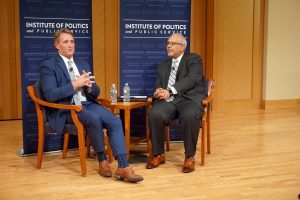GU Politics hosted its second ever “Mockus,” a student-focused simulation of the Iowa caucus, on Jan. 28. Student supporters of Democratic candidates for president moved into groups to vote and win over undecided voters.
Iowa caucus veterans Kate Waters and Pat Burgwinkle, who both worked on Hillary Clinton’s 2016 campaign in Iowa, explained the complicated rules behind the Iowa caucus.
“When people say the Iowa caucus, what they actually mean are the 1,678 individual precinct caucuses that take place in every precinct in Iowa,” Burgwinkle said. While the Mockus modeled one of these events, it did not recreate the county and state-level conventions that actually assign delegates to candidates.
Speaking from her own experience, Waters said, “Iowa has this a little more figured out—they’ve just been doing it longer.”
When it came time to start, students moved to designated zones, depending on which candidate they supported. While each candidate’s supporters had two minutes to try and sway undecided voters, no one moved to a different candidate. At the end of this time, Elizabeth Warren led the pack with 13 votes, while Bernie Sanders, Pete Buttigieg, and Amy Klobuchar all tied for second place with 9.
Similar to the real caucus, a candidate needed the support of at least 15% of the 52 students in attendance in order to be considered viable. This meant that candidates receiving under 8 votes—namely Joe Biden with 6, Michael Bennet with 2, and Michael Bloomberg with 1—were eliminated after the first round and unable to earn delegates. These 9 students were then able to choose one of the eligible candidates to support in the second round, while those who had already supported an eligible candidate were unable to change their vote.
During the second round, Biden supporters splintered between Warren and Klobuchar. Bennet’s supporters switched to Warren while the Bloomberg supporter joined Buttigieg. One student, a Biden supporter, chose not to realign with a different candidate.
Once the second realignment was complete, GU Politics reported that Warren had 19 supporters, Klobuchar 13, Buttigieg 10, and Sanders 9.
The student vote was translated into a number of delegates for each candidate. Of the 8 mock delegates available, Warren earned 3, Klobuchar and Buttigieg each earned 2, and Sanders earned 1.
GUPolitics first hosted the Mockus in 2016, where Clinton received an overwhelming 89% of the vote compared to Sanders’s 11% (Martin O’Malley received no votes). While Sanders also received the fewest votes in the final round of this year’s Mockus, his support increased to 18% of student participants.
Given the complexity behind the caucus system, Waters recognizes the challenges surrounding campaign strategy, news outlets trying to report winners, and everyday voters. “If it feels confusing, it’s because it is confusing,” Waters said, but also that “it’s a way to get more people involved in the process.”





